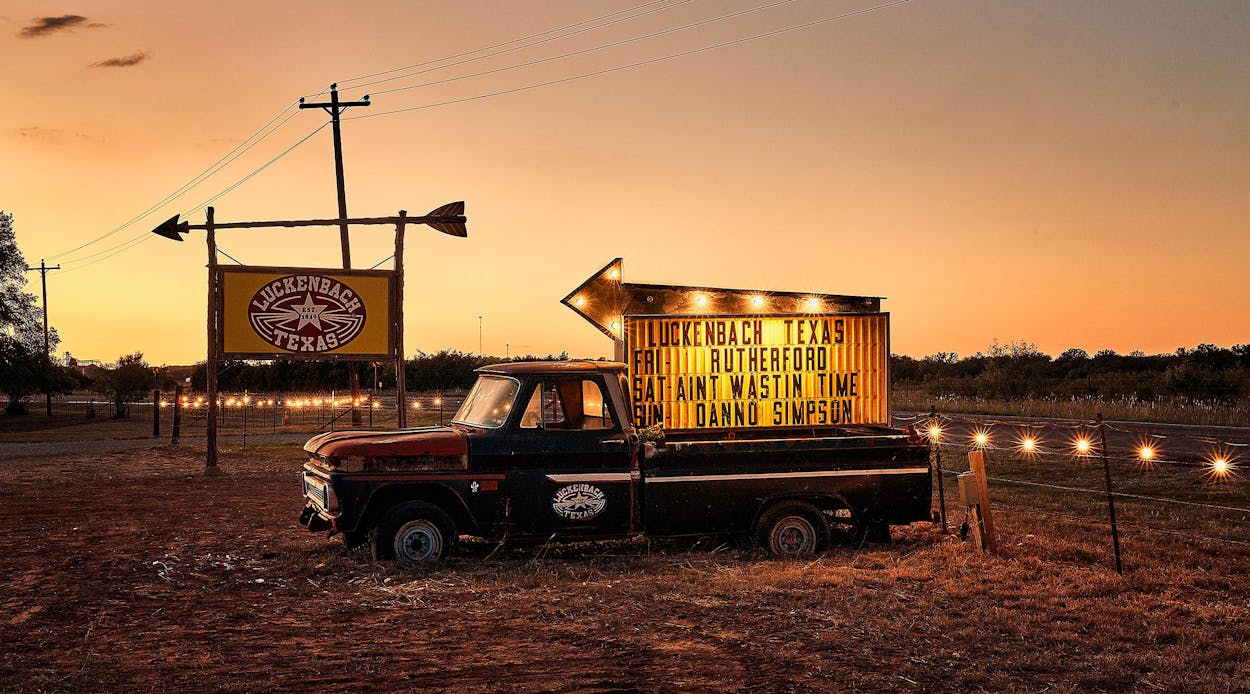It’s Friday evening in Luckenbach, Texas. The sun has just started to dip behind the live oaks that tower over the famous nineteenth-century dance hall and neighboring general store. Recent rains have greened the grass and cooled the final days of this hot, dry summer. Day drinkers linger in the shade at wooden picnic tables, and just beyond them, tall cypress trees line a shallow stream known as Snail Creek. I step out of my truck and head toward the dimly lit bar tucked in the back of the general store. It feels a little like going home.
Inside, I find a deserted corner, order a Lone Star, prop my boots up on the empty stool next to mine, and watch as folks trickle in. Some visit Luckenbach to see a certain band or attend a festival or tour the Hill Country back roads on a Harley. Others make the pilgrimage because they’ve heard the Waylon Jennings song—you know the one, about getting “back to the basics of love.” To Luckenbach’s many devotees, the place embodies a wholesome, laid-back Texas where things are simpler and steeped in history.
Tonight, there are bucket-listers in tie-dyed T-shirts and bikers with telltale stains of back sweat. A woman in shimmering purple shorts and boots to match scans the drink menu for bubbles. (Disappointed, she settles for rosé.) A paunchy rancher in a grimy straw hat sets a wooden beer token on the bar. The bartender slides him a Miller Lite. A man wearing Ecco sandals over socks wanders through, acting as tour guide for the little group that trails him, their heads swiveling to gawk at the clutter of artifacts.
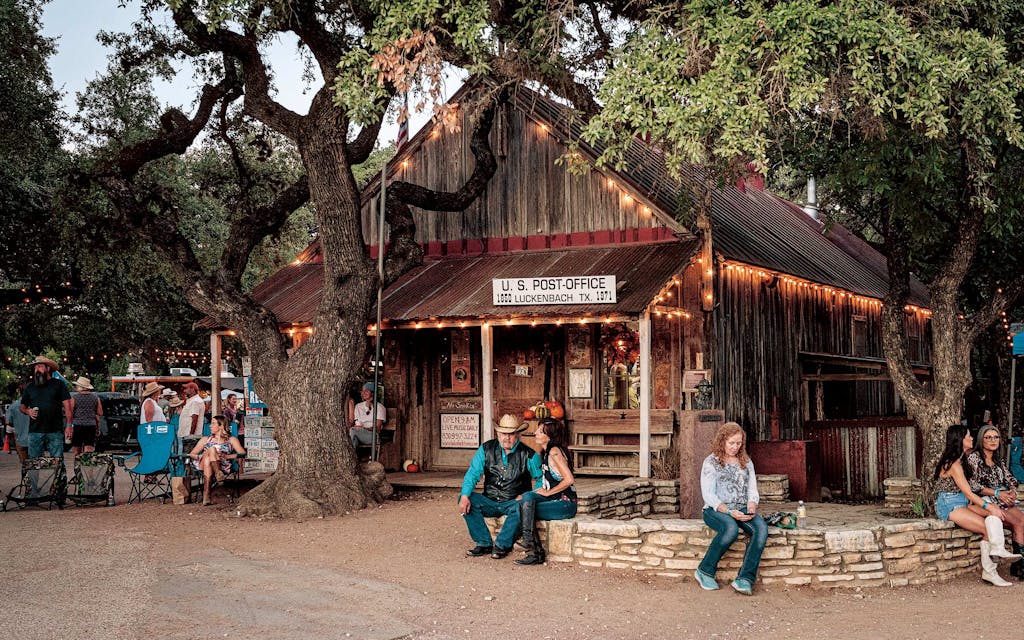
For a room this small, no bigger than twenty feet square, there’s a lot to take in. Neon glows against weathered wooden walls covered in yellowed newspaper clippings and framed photographs of Luckenbach legends: Jerry Jeff Walker, Willie Nelson, and Sheriff Marge, to name a few. Signs in German hark back to the venue’s roots, as does a cobwebbed chair suspended from the rafters. The seat is reserved for Benny Luckenbach—dead nearly fifty years—one of the many regulars who once frequented the joint, swapping stories in a particular German accent heard only in Gillespie County. At the room’s center is a cast-iron stove that warms the bar when the temperature drops, and the sight of it brings back memories of cold nights I’ve spent picking my guitar around its toasty glow. Overseeing it all, hanging over the center of the bar, is a portrait of John Russell “Hondo” Crouch, the fabled raconteur who owned the place from 1971 until his untimely death in 1976.
Hondo was something of a redneck Renaissance man: a writer, humorist, musician, goat rancher, summer camp counselor, chili cook, and, as his card read, “Imagineer.” (His use of the term appears to predate Disney’s, though he openly admitted to stealing it from a rich man he once met in Dallas.) Originally from the small town of Hondo, forty miles west of San Antonio, he earned the nickname from reporters who covered the cowboy wunderkind during his all-American swimming days at the University of Texas at Austin. While at UT, he was inspired by J. Frank Dobie, whom he called “Uncle Frank,” to study Texas folklore.
He married into considerable wealth—in 1943, he wed Helen Ruth “Shatzie” Stieler, the daughter of “the Goat King,” who built his small empire on Angora mohair—and the couple eventually settled on a ranch near Comfort. There, his talent for showmanship and a penchant for good times attracted guests ranging from jeweler James Avery to Jerry Jeff Walker, the rowdy New York folk singer turned Texas icon who grew to love Hondo as a surrogate father figure.
Some considered Hondo’s public persona, which was akin to a hillbilly pagliaccio, an absurd caricature. He wore a battered cowboy hat that looked as if it had been trampled by his goats, a red bandanna tied haphazardly around his neck, and a tobacco-stained shirt tucked into jeans that were tucked into boots. Friends and family knew his country bumpkin character was a curated front. Hondo had a shrewd wit and wrote a satirical column for the Comfort News about a make-believe town called Cedar Creek. He was a gifted performer who captivated audiences with a mix of poetry, wild yarns, and Mexican corridos sung while strumming a worn guitar. Toward the end of his life, he was earning up to $100 a minute for speaking engagements.
Hondo, though, is best known for his role in Luckenbach’s history. The popular story goes that in January 1971, he and William “Guich” Koock, another Dobie disciple and a much-younger friend of Hondo’s, spotted an ad in the Fredericksburg Standard offering a “town for sale.” Hondo and Guich (pronounced “Geech”) hopped in Hondo’s old pickup, drove to Luckenbach, and bought the whole place from the septuagenarian owners, Benno Engel and his wife, Elizabeth Klier, for $29,000 (the equivalent of about $212,000 today). By most accounts, Hondo rescued the little town, about ten miles southeast of Fredericksburg, from the brink of extinction. He now had his own real-life Cedar Creek and a canvas for his imagination.
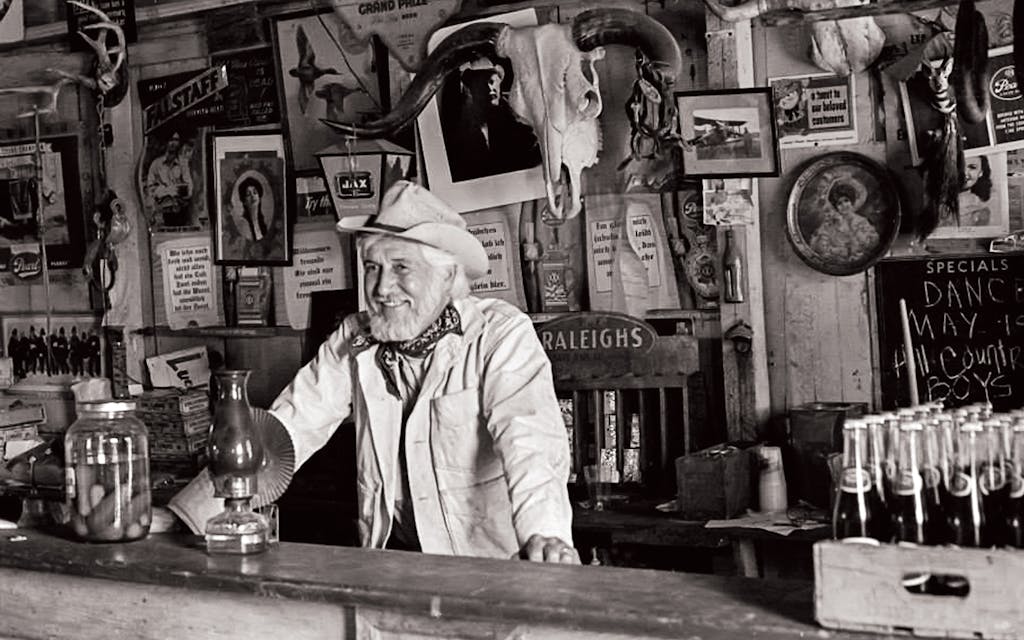
The much-abbreviated version of what happened next is this: thanks to Hondo’s magnetic personality, Guich’s knack for staging outlandish events, and their uncanny ability to generate press coverage, the cult of Luckenbach grew. In 1973 Jerry Jeff went there to record his masterpiece, ¡Viva Terlingua! The album went gold and became a seminal statement of the outlaw-country movement. That same year, Luckenbach hosted its first World’s Fair, drawing 20,000 visitors over two days. Other festivals followed, usually with a cadre of national reporters in attendance.
Hondo died suddenly of a heart attack in 1976. He was only 59. That might have been the death knell for Luckenbach as we know it, but the following year Waylon Jennings recorded “Luckenbach, Texas (Back to the Basics of Love).” The song—written by two Nashville composers who’d never set foot in the tiny town—was a sensation. Soon folks from around the world started streaming in: convoys of motorcycles, cars, and, for the first time, tour buses. Beginning in 1995, Willie Nelson gave the place another jolt of energy by holding five consecutive Fourth of July picnics there. Then, in the mid-2000s, a woman named Abbey Road, Luckenbach’s events manager at the time, helped spur a revitalization of the venue’s musical legacy. Most weekends the dance hall was packed with Texas country fans, and during the day, you could often find gifted songwriters such as Walt Wilkins or a young Ryan Bingham hosting pickin’ circles under the big oak trees.
This was the era when I found Luckenbach. While a student at Texas State University, I spent many weekends driving the beautiful back roads from San Marcos to drink beer and play my Alvarez in one such circle. In 2009 I was one of the 1,868 volunteers who showed up to help Luckenbach break a Guinness World Record for “the largest recorded guitar ensemble.” The song we played was—no surprise—“Luckenbach, Texas.”
But the memories I cherish most are the times I spent there playing songs with my late mentor and friend, Kent Finlay. Kent owned a honky-tonk in San Marcos called Cheatham Street Warehouse, which he’d been inspired to open in 1974 by his hero and mentor, Hondo Crouch. On a few occasions Kent and I made the hour-long drive to Luckenbach together, stopping along the way at the Blanco Bowling Club for a burger. I wrote about one of the wintry nights we spent swapping songs around the wood-burning stove. When I showed it to Kent, he urged me to send it to Luckenbach’s tiny monthly newspaper, the Luckenbach Moon. It was the first freelance article I ever published. That night remains one of the best of my life.
So, late last year, I was deeply troubled when I received an email from Kit Patterson, Hondo’s grandson. “A wealthy developer is actively working to build a mega-development and distillery that over-commercializes the area and endangers the magic and ecology of Luckenbach,” he wrote. The threat he described sounded existential. I wrote back and promised to meet up soon.
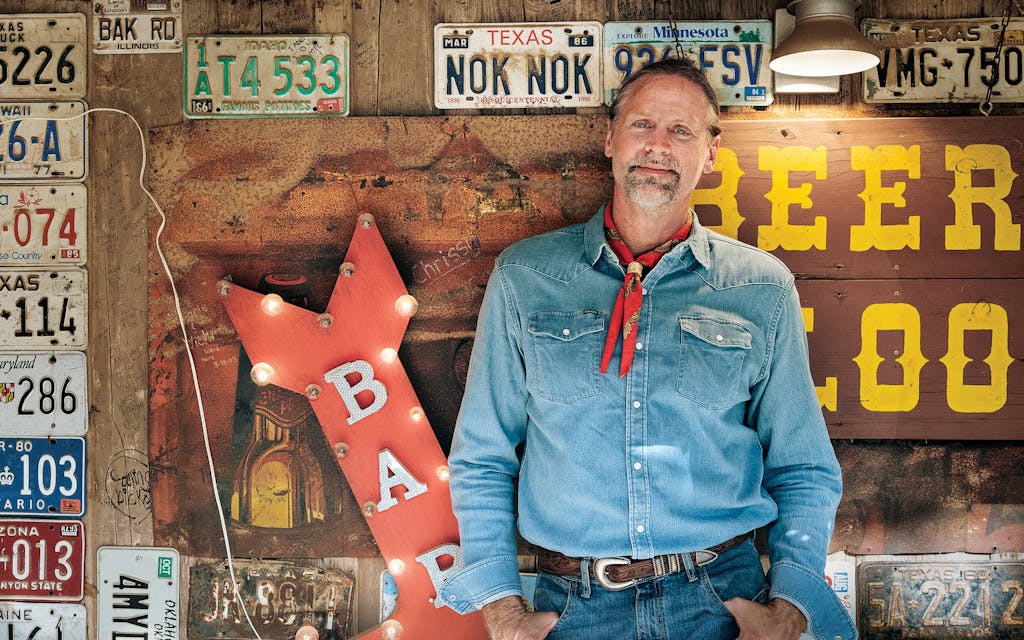
Over spicy bowls of red at the Texas Chili Parlor, in Austin, I told Patterson about my history with the dance hall. He nodded. As the president of Luckenbach Texas Inc., or LTI, the corporation that owns and runs the dance hall and general store, Patterson has heard a lot of stories like mine. “Our mission at Luckenbach is making friends, music, and memories,” he told me. “But Luckenbach’s become famous and popular, and people have ideas. They want to do things that are going to make them money.”
Patterson, who is 51, sounded at times like a spiritual cousin of Matthew McConaughey. He exudes the same Texas-surfer vibe; his speech is peppered with zenlike idioms about moving “at the pace of grace.” He remembers being four or five years old, hanging out on the general store’s porch with his grandfather Hondo, whom Patterson described as “a mix of Will Rogers and Peter Pan.” The white-whiskered “mayor of Luckenbach” would sit and whittle while chewing Tinsley tobacco. This was the mid-seventies, and his grandfather was already famous.
As we plowed through our chili, Patterson expounded on his email. Stewart Skloss, the CEO of Frontier Spirits, was building a sprawling 117-acre development less than five miles from the dance hall. The plans, which had originally included a music venue and recording studio, now called for a 28,000-square-foot distillery along with a hotel, a Harley-Davidson dealership, a Salt Lick BBQ joint, a Mexican restaurant, an apartment complex, and twelve dry goods stores. There wasn’t much Patterson could do about most of the planned development, but Skloss’s new distillery was another matter. He was calling it Luckenbach Road Whiskey. So LTI challenged the whiskey plant on the basis that using the word “Luckenbach” in its name would confuse customers and siphon off revenue that would otherwise belong to LTI.
LTI had sent multiple cease and desist letters claiming trademark infringement, but Skloss was defiant. His Luckenbach-branded whiskey is now in stores. “It almost makes me break out in hives talking about federal courts and judges,” Patterson told me. But he and his aunt, Cris Crouch Graham, who owns the other half of LTI, had decided to go ahead and sue Frontier Spirits.
A few months later, on a warm June morning, a preliminary injunction hearing was held on the fifth floor of the federal courthouse in Austin. It felt about as far as you could get from the easygoing charm of Luckenbach. The wood-paneled courtroom smelled like coffee breath. Patterson watched the proceedings on Zoom as a team of four lawyers represented LTI. Across from them, Skloss’s attorneys clustered around a long table, including one named Lance Luckenbach, a distant relative of the pioneering German family who settled the area. At the head sat Skloss. Wearing a dark suit and chunky-framed glasses, and with his thinning black hair slicked back, he looked as if he might have stepped off a Texas-set Scorsese film—a swaggering tough guy who, I’d come to learn, drives a bulletproof SUV and tends to brag about his size 14 boots.
For both parties, the stakes were high. If the injunction were granted, the judge could force Skloss to suspend the manufacturing of Luckenbach Road Whiskey and have bottles pulled from the shelves. According to Skloss’s lawyers, such action would cause “catastrophic harm” not only to his new whiskey venture but also to the Pura Vida tequila company he’d launched back in 2011.
Karen Burgess, LTI’s lead attorney, made the opening statement. “The Luckenbach name has been built up for fifty years. Hard to believe that a cowboy poet thought about trademarks, but he did.” Now, she said, “Luckenbach Road Whiskey has come in and taken that confusingly similar name to take advantage of that fifty years of investment.”
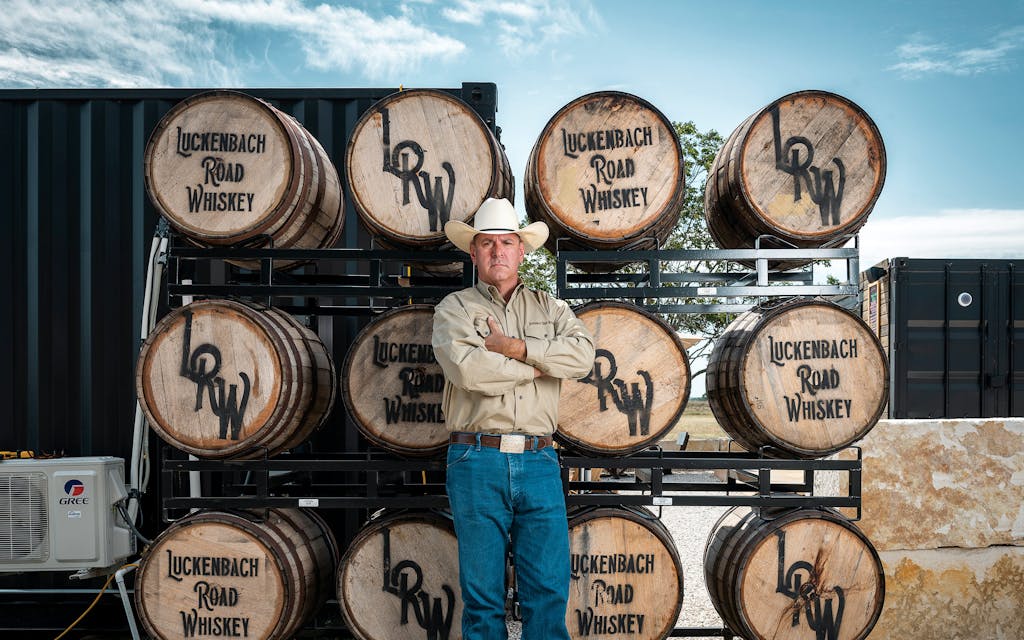
Nick Guinn, Skloss’s lawyer, countered that LTI had no basis for its suit, claiming that the name “Luckenbach Road Whiskey” was chosen not to draft off of LTI’s popularity but because the distillery is located at 21 Luckenbach Road. He argued that consumers would not be confused in part because LTI was inflating its name recognition. “Elvis is famous,” he said. “Luckenbach, Texas, is not. It may be well known to some, country music fans perhaps, but a trademark-law fame is an extremely high burden to show.”
LTI lawyers soon produced emails suggesting Skloss himself didn’t believe Guinn’s argument. Skloss had discussed a possible whiskey collaboration with LTI as far back as 2015. Patterson’s partner Cris Graham, along with her husband, John, were initially open to the idea. Patterson was not. For the next few years, Skloss continued talking with the Grahams anyway. In 2017 he and John batted around the idea of a Hondo-inspired whiskey, but in an email to John, Skloss made it clear Hondo wasn’t the name he was after: “Everyone in Texas knows the Luckenbach name, only those that know the Luckenbach story will know of Hondo. That would be a $20MM gamble that I realistically can’t afford and don’t think my investor base would either. I am sure Kit [Patterson] will come around, willingly or not.”
But Skloss’s attempts to court Patterson failed, so he went his own way. Skloss contracted with MGP, a massive Indiana distillery that produces spirits sold under hundreds of brand names, to start producing Luckenbach Road Whiskey. (It’s bottled on-site at Skloss’s makeshift distillery.)
Throughout the day, LTI’s lawyers repeatedly pointed to what they considered Skloss’s history of impropriety. Over the past three decades, he has been sued no less than thirty times while working in a variety of industries, from construction to oil and gas. He even owned a now-defunct San Antonio restaurant called Renob Café y Cantina (Renob is “Boner” spelled backward). All the while, the lawyers said, he left behind a trail of contractors, creditors, landlords, and an independent school district who alleged he owed them money. (At the trial, Skloss denied any wrongdoing and said he doesn’t owe anyone anything.) Several of these suits were dropped or settled, but some have gone to summary judgments. One suit echoed LTI’s current grievance. In 2012 the makers of Cointreau sued Skloss for importing a Mexican orange liqueur under the name “Controy.” A federal judge ruled that Pura Vida had infringed on Cointreau’s mark and ordered Skloss to cease using the name. “You can see what he’s done,” Burgess, the lead counsel for LTI, told the judge. She went on to cite Skloss’s own words from an earlier deposition, that to sell an alcohol brand, “you need to have a story, a celebrity, or a ton of money.” She paused. “Here, he’s got a story because he’s got Cointreau. And now he’s got a story because he’s got Luckenbach.”
Skloss’s lawyers struck back by alleging malfeasance on the part of LTI. Just months before Luckenbach Road Whiskey hit shelves, LTI brought out its own limited-run whiskey, a partnership with Balcones Distilling, in Waco. Skloss’s team argued that this was a violation of Texas’s tied-house laws, which prohibit all retailers (bars, music venues, and stores) from manufacturing alcohol. In other words, they claimed it was illegal for LTI to make any booze, so long as it remained in the bar business. Though it’s unclear how a collaboration between Skloss and LTI would have complied with this statute, his attorneys called upon a former agent of the Texas Alcoholic Beverage Commission, who testified that the licensing agreement between LTI and Balcones is “unlawful.” (A TABC investigation is currently ongoing.)
Even so, the case against Skloss was mounting. Then, as the proceeding neared its 5 p.m. cutoff, Skloss’s lawyers called one last witness. Paul Engel, a peach farmer from Fredericksburg, strode from his seat in the back of the room to the witness stand. The 49-year-old wore dark slacks and a black-and-white plaid shirt—the only man in the courtroom not wearing a blazer and tie—and his messy brown hair looked as if it would have a cap back on it the moment he was outside.
“My name is Paul Engel,” he began. “I live in Fredericksburg, Texas. I’m a lifelong farmer there. . . My family was some of the founding people of Luckenbach.” From there, the story he told began to upend everything I thought I knew about the origins of Luckenbach and the legacy of Hondo Crouch.
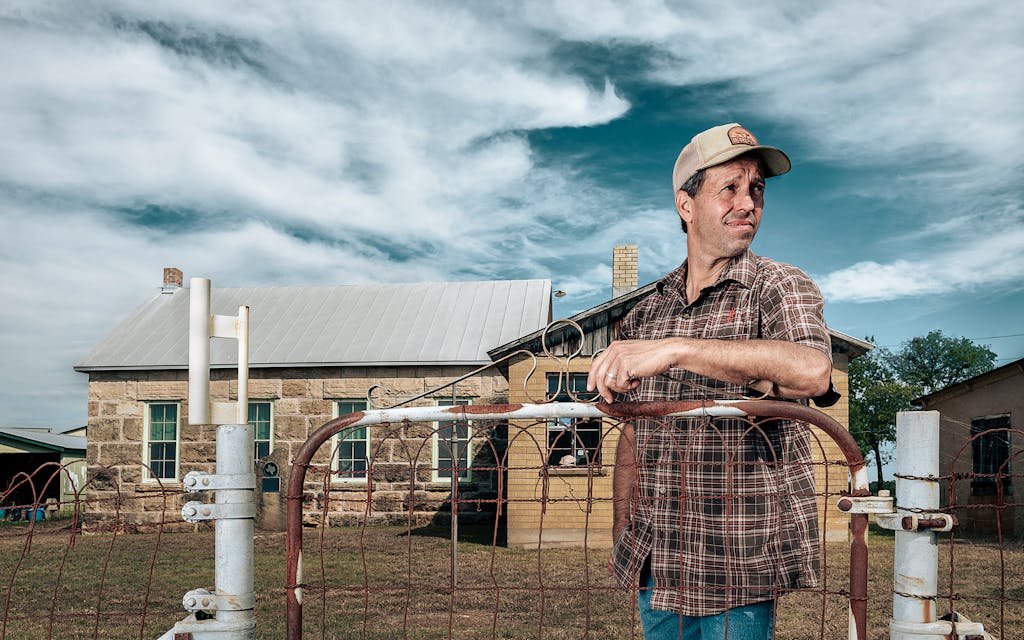
In early September I met Engel for lunch at Hondo’s on Main. The Fredericksburg restaurant and bar is owned by Cris Graham, and the inside is a sort of shrine to her late father, covered with framed photos and magazine covers. As we ate enchiladas, Engel told me how he came to take the stand that day. “I think the average person would be pretty disgusted if they knew the whole story.”
His family had been among the first Germans to settle the Hill Country, in 1846. The Engels purchased land in the area now known as Luckenbach in the mid-1880s. In fact, Paul’s great-great-aunt Minna Engel gave the place its name. In 1886, when Minna’s brother opened a new post office, she chose to call it Luckenbach, after her husband, Carl Albert Luckenbach. The name stuck. The Engels went on to build the dance hall and the general store, and they worked in the blacksmith shop and cotton gin that were once part of the property. It was Paul’s great-uncle Benno Engel who later sold the 9.124 acres that included the dance hall and general store to Hondo Crouch and Guich Koock. The Engel family still owns large tracts of land immediately surrounding that acreage.
In 2014 Engel opened the first of six rustic cabins on the other side of Grape Creek, a stone’s throw from the Luckenbach general store. He called his place Luckenbach Lodge. He had envisioned a mutually beneficial relationship with LTI. Maybe he could leave beer coupons for his guests that would help steer people across the creek to buy a tchotchke or an “Everybody’s Somebody in Luckenbach” T-shirt from the general store. Perhaps LTI could handle the reservations and collect a booking fee. Engel says he and Patterson discussed a possible arrangement over the next couple of years, but nothing ever came of it.
Then, in February 2016, LTI’s lawyers sent a letter saying Engel’s business had until the end of the month to stop using “Luckenbach” in its name and marketing. Eventually, in 2019, Engel was summoned to court. Much like in its case against Skloss, LTI claimed that Engel’s use of the word would cause confusion between his enterprise and LTI’s.
Trademark law is notoriously vague and subjective. It’s not permissible to trademark terms that are geographically descriptive, such as the name of a town. But if a geographic descriptor is used over time to identify the “source” of a certain set of goods or services (in this case LTI’s entertainment services and merchandise), it can take on what’s known as a “secondary meaning.” LTI was contending that the public has come to understand Luckenbach to mean solely the dance hall and store. It also was arguing that Luckenbach was not actually geographically descriptive.
Engel chose to fight the suit. Luckenbach, he countered, should never have been trademarked at all. It’s the name of a community—a community where his friends and family have lived and died for more than a century. By asserting that Luckenbach is merely a private entertainment venue confined to the nine acres Hondo purchased, Engel claims that LTI is distorting history.
At the restaurant, he pulled out his cellphone and showed me a picture of the Luckenbach general store, the most iconic building on the property. For decades, a white sign has hung above the door reading, “U.S. Post-Office / Luckenbach, Texas.” “What’s missing from that sign?” Engel asked. He zoomed in. Between the words “Luckenbach” and “Texas,” someone had obscured the comma with off-white paint. That may seem a small thing, but here was the core of Engel’s argument: after fifty years of building its brand around Luckenbach’s identity as a real place on the map, LTI was now literally trying to paint over that history and deny that Luckenbach denotes a geographic location. Engel shook his head in bewilderment.
After lunch, we loaded into Engel’s dually pickup and drove southeast, ten miles down Highway 290 to his peach stand and orchard. The Engels have been farming in Luckenbach for five generations. It was near the end of the season, but the peach trees on the far east end were still laden with fruit. Engel parked the truck. We padded through the neatly planted rows, and he paused to pluck a ruby-colored peach from one of the arching branches. With an economy of motion earned through decades of repetition, he twisted it open and proudly placed the fuzz-covered fruit in my palm. It was a bit small and had a distinctive tart-sweetness reminiscent of a cherry.
“My son loves this ag stuff,” he told me, handing me another halved peach. His son, William, is eight and has already thrown himself into the family business. “He can do it all out here. He runs the credit cards and does the math in his head. People are amazed. This little bitty fart,” Engel laughed. “About three years ago, he started giving orchard tours. At the time, he was saving five grand for his own hay cutter. This year he moved on from that, and now he’s doing magic tricks for fifty cents. If he gets it wrong, you get your money back.” Listening to Engel talk about his son, I realized how personal this battle is for him. It’s about his heritage.
From Engel Orchards, we drove down Luckenbach Road, past the site of
Skloss’s planned distillery, where shipping containers housing barrels of whiskey occupied the caliche pad. At the entrance to the property, a nest of cameras pointed in every direction.
Farther down the road, we cruised past some land where Engel runs a few head of cattle, past cemeteries where his relatives are buried, and came to a stop at the Luckenbach School House. As we walked up, he pointed out his paternal grandmother’s house next door. Back in 1855, one of Engel’s ancestors on his father’s side, Peter Pehl, deeded this land to build the community’s first school. The original log building was later replaced by the impressive limestone structure that stands here today. The school continued serving students until 1964, when it was consolidated into Fredericksburg ISD. Since then, the Luckenbach Community Club has maintained the building, and it is still actively used. In fact, Engel’s family would be meeting there for a reunion in just a few weeks.
To Engel, this isn’t just nostalgia—it’s evidence. He argues that the school, which sits on Luckenbach Road about half a mile north of the general store and well beyond LTI’s nine acres, disproves LTI’s claim that “Luckenbach” refers exclusively to its property. This landmark and others like it, including the Luckenbach Cemetery, are well known to LTI. Engel cites a 1999 article in the Luckenbach Moon: “Our Luckenbach School is one of 10 remaining country schools out of the 12 in Gillespie County that is still used by an active community club for domino and pinochle parties, reunions, and social gatherings. The Engle [sic] family, who still live in the Luckenbach Community today, were charter developers and students.”
The article was written by Becky Crouch Patterson, Kit’s mother, Cris Graham’s sister, and Hondo’s oldest daughter. In 2018 she published a book called Luckenbach Texas: The Center of the Universe. In one chapter, she writes that there “are other Luckenbach residents scattered near the school, the cemetery, and down country roads, out around oat fields.”
Throughout the day, Engel rattled off a litany of other examples to back up his claim that Luckenbach is a specific geographic destination: the Texas State Comptroller’s tax roll list, TxDOT’s official highway map, and the birth and death certificates of various family members, including his father. He pointed out other nearby names on the map—Stonewall, Hye, Grapetown, and Comfort—all real places like Luckenbach, despite being unincorporated. At one point, Engel stopped at Behrends Feed and Fertilizer, a mile northwest of the Luckenbach general store. One of the state’s largest independent feed mills, the business was established in 1955 and remains a busy hub for local farmers, ranchers, and hunters. I went inside to fetch a Coke and noticed Behrends was selling ball caps and T-shirts bearing the business name and its location: Luckenbach, Texas. The bags of deer corn we loaded into Paul’s truck bed were printed with the same.
Despite what Engel and his lawyers feel are clear examples of Luckenbach’s existence beyond one corporation’s property lines, LTI has argued that his evidence “about the purported ‘Luckenbach community’ should be stricken . . . as self-serving speculation and hearsay.” Meanwhile, several other area residents have been sent cease and desist letters, including a cattle company that has been ranching in the area for five generations.
Glen Treibs has lived in Fredericksburg for more than seven decades and is widely respected as an expert on Gillespie County’s history. He’s friendly with the Crouch family, but when I spoke with him by phone, he was candid. “The whole area is called Luckenbach,” he said. “I don’t see how [LTI] could trademark it. Who in God’s name did they think put a line around their property?”
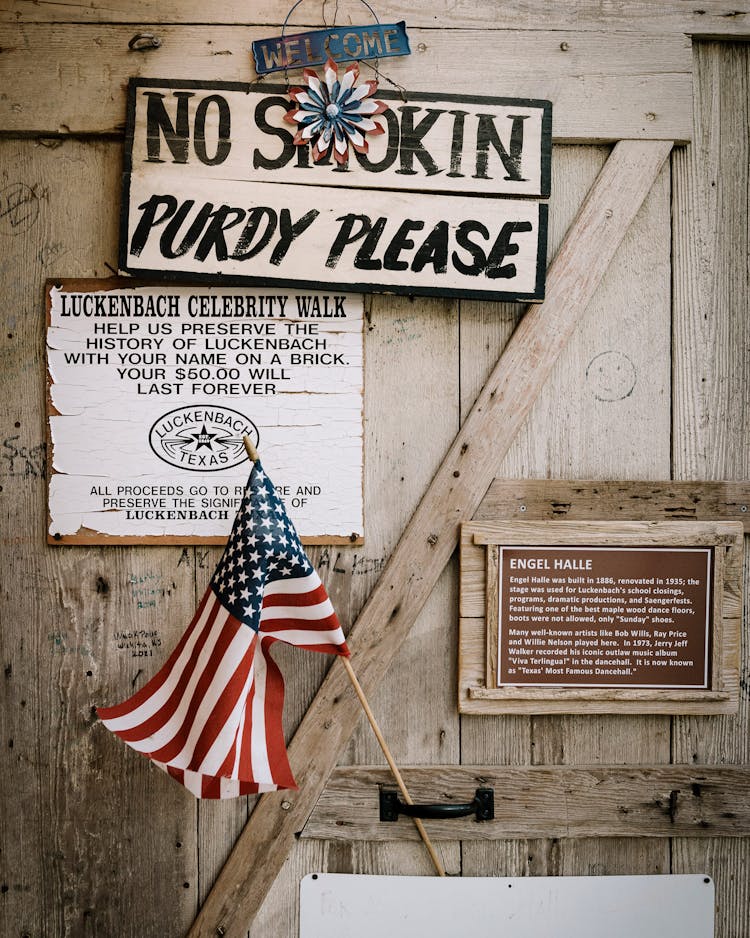
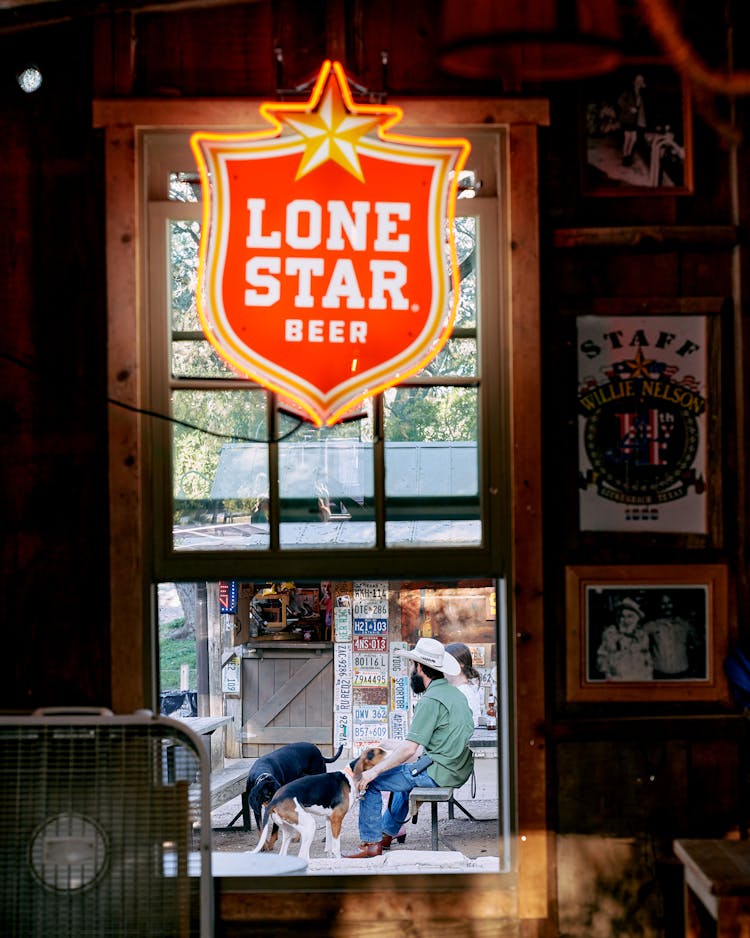
Engel steered his dirt-coated Dodge down Ranch-to-Market Road 1376 and turned onto Luckenbach Town Loop, where the dance hall came into view. “This field was full of willows,” he said, pointing to what’s now a caliche parking lot. Just a few years ago, you couldn’t see the general store or any other buildings from the road because the trees were so dense, but LTI had taken a bulldozer to the area. He paused the truck in front of a flagstone house some two hundred yards from the dance hall. This was his grandparents’ house, the place where his father was born. His aunt owns it today.
As a kid in the seventies, Engel spent a lot of time out here. He remembers his grandmother’s milk cow wading all day in nearby Grape Creek and, without any prompting, moseying home to her pen in the evening. His grandmother sold fresh cream and butter to visitors at the general store, and his grandfather Armin would send Engel down to the general store to fetch him a fresh pack of smokes—that is, if Armin weren’t already in the beer tavern playing dominoes with Benny Luckenbach and other German farmers in the area who continued meeting there after it was sold to Hondo.
This community was originally known as South Grape Creek, first settled in the 1850s by Jacob Luckenbach and several other German immigrant families shortly after the founding of Fredericksburg. The Engels purchased land here in 1885 from Jacob’s son Carl Albert Luckenbach. August Engel Jr. opened the first Luckenbach post office in his home in 1886, and sometime shortly thereafter, the family built the dance hall and the general store/post office/tavern. (A white line still painted on the general store floor marks the spot where the post office began, thus indicating where patrons were prohibited by law from drinking beer.) August’s brother William took over as postmaster in 1890 and ran the store until he died suddenly at the cotton gin in 1935. That’s when the business turned over to Engel’s grandfather Armin and great-uncle Benno.
The focal point of the community, as in many German Hill Country towns, was the dance hall.
For the next three decades, the Engel brothers ran the various businesses—ginning cotton, trading furs, operating the store, and farming fruit and other produce. They also developed a profitable egg route. Locals would bring in their extra eggs to barter for various goods, and the Engels would package and sell them in San Antonio.
The focal point of the community, as in many German Hill Country towns, was the dance hall. Weddings, funerals, reunions, and community meetings were held here. The Luckenbach singing and shooting clubs met here starting in the late 1800s. Monthly dances drew families from the surrounding hills. Notices for these gatherings were placed in the Fredericksburg Standard going back to at least 1923, when this one appeared: “Grand Masquerade Ball at Luckenbach, Texas in Engel’s Hall . . . Good music and refreshments provided for. Everybody Welcome.”
Everything changed in the early sixties, when Armin and Benno split the businesses. “My grandfather wanted to modernize and get refrigerated equipment,” Engel told me. “And my great-uncle did not want to. So they had a falling-out. My grandfather got all the land, the farm, and my great-uncle got the nine acres and the store.” Benno ran the store and served as postmaster for another decade, but by the end of 1970, he was looking to retire. In January 1971, he ran an ad in the classifieds of the Standard: “FOR LEASE OR RENT: Luckenbach general store. Beer saloon, dance hall, warehouse and egg route. Egg route will easily pay for rent.”
What happened next became Texas legend.
The most well-trodden version of the tale, repeated in hundreds of articles since 1971, goes something like this: Hondo was looking for a place to stop and drink an after-work beer somewhere between his two ranches when he noticed an ad in the paper—“town for sale, pop. 3” in this retelling—and he went and bought himself a town. His partner at the time, Guich Koock, remembers it differently.
“Shatzie [Hondo’s wife] is the one who found the ad in the paper,” Koock told me when I got him on the phone. “Hondo was having a hard time, staying out late in the bars and having lots of personal problems.” Shatzie thought that running the general store would be good for Hondo. “Shatzie called me and said, ‘I’ll put up the down payment, if you’ll make the monthly installments and will take Hondo as a partner.’ I agreed to do it because Hondo was a hero of mine.”
According to Guich, Hondo wasn’t even originally into the idea—he wasn’t much for having a partner. But they all knew Benno; Guich’s family reunions were held in Engel’s Hall. Benno was asking $30,000. “It included the egg route, the feed store, the general store, a blacksmith shop, the dance hall, the cotton gin, and a pickup truck,” Guich said. “We thought that was high, so we talked him down to $29,000. Shatzie put $10,000 down. And the egg route was going to make the rest of the monthly payment.”
However the initial sale went down, LTI is adamant that had Hondo not showed up and rescued the town, as Patterson told me, “hardly anybody would even give a flip or care about Luckenbach.” During the injunction hearing, LTI’s attorney had quoted Jerry Jeff Walker’s song “Viva Luckenbach” to suggest that Luckenbach would have faded into obscurity if not for Hondo: “In the fifties people moved to cities / Leaving it all behind / Luckenbach closed down for good / It just fell on a harder time / One day Hondo, driving by / Wished he had a beer / So he bought the place and he opened it up / That’s the reason we’re all here.”
But Jerry Jeff was no historian. Luckenbach, while never a thriving metropolis, was far from “closed down.” During the sixties, the Hill Country entered the national consciousness as “LBJ Country,” and news reporters flocked to the region’s tiny hamlets, including Luckenbach. At least one film crew stopped by to capture the town’s easy pace and pastoral vibes. And though they’re mostly forgotten today, two B movies were filmed there: The Naked Witch in 1959 and Strawberries Need Rain in 1970. Perhaps most telling are the multiple articles written before the Hondo era, including a pair of columns by Frank X. Tolbert, a popular Texas writer of that era, about how fond he was of “loafing” in Luckenbach. After the sale was announced, Tolbert wrote another about how he wished he could buy the place himself. For the most part, business simply continued much as it had before. The same bands that played when Benno was owner continued playing for years after the venue changed hands.
Luckenbach did see one big change shortly after the sale. In February 1971, Benno stepped down as postmaster, and a few months later the U.S. Postal Service closed the post office and retired the zip code. Suddenly, 37 families now had to collect their mail in Fredericksburg. That put a dent in the general store’s sales. The popular narrative suggests that Benno had kept his planned resignation a secret from the buyers and that the decline in customers forced the new owners to get creative to stay afloat. But the deed wasn’t signed until January of 1972, long after the post office had been decommissioned.
The early days of Hondo’s reign as “the clown prince of Luckenbach” were breathlessly reported upon—in the pages of Sports Illustrated and the Washington Post, and on national news broadcasts—usually centering Hondo as the hayseed mastermind, especially of the zany events that attracted large crowds. But Guich said that’s not accurate either. He said he came up with the World’s Fair, and that a professional PR guru, Jack Harmon, came up with many of the other events. “Hondo did not like having the festivals,” Guich said. “For the first fair, I had a two-hundred-dollar budget. And it all came out of my own pocket because Hondo didn’t want to pay for it. He always thought the festivals wouldn’t work. A couple of days before the first World Fair, Hondo called the San Antonio papers and told them we had called the fair off. I had to tell the reporters that, yes, it was still on. We made almost three hundred thousand dollars in three years with the festivals.”
This era produced most of what became LTI’s trademarks, including the name, the motto (“Everybody’s Somebody in Luckenbach”), and the logo, which features a long oval with a star in the middle. Written on the star is “Est. 1849.” Jacob Luckenbach didn’t settle this area until the early 1850s, and I was unable to find any relevant events tied to that year, something Guich later confirmed. “We had a lot of dates we just made up,” he said. “1849 was a date that I made up because I liked it.”
Several pages on LTI’s website, which the company submitted as evidence in court to bolster its version of the Luckenbach story, claim that Minna Engel opened an “Indian trading post” at the present-day spot of the general store in 1849. But Minna wasn’t born until 1861. When I asked Patterson about this discrepancy, he said that much of that early history has been passed down from various parties and hadn’t been independently verified. He noted that even the state historical marker in front of the general store is off by a year in its last sentence: “John Russell ‘Hondo’ Crouch and others bought the town center in 1970 and promoted its rustic atmosphere.”
To Guich, the marker is another reminder that he’s largely been scrubbed from the Luckenbach story. The property wasn’t bought by “Hondo Crouch and others,” he said. “No, it was Guich and Hondo.” Still, some might argue it’s relatively harmless for LTI to promote the mythic narrative. But Engel believes that the corporation is distorting history to preserve its trademark, which in turn harms long-standing members of the community. Behrends, for example, recently signed a licensing agreement with LTI in order to use the name Luckenbach, despite the fact that the business long predates the existence of LTI. Engel has refused to make such concessions. His trial with LTI is scheduled for late October. He says he’s ready.
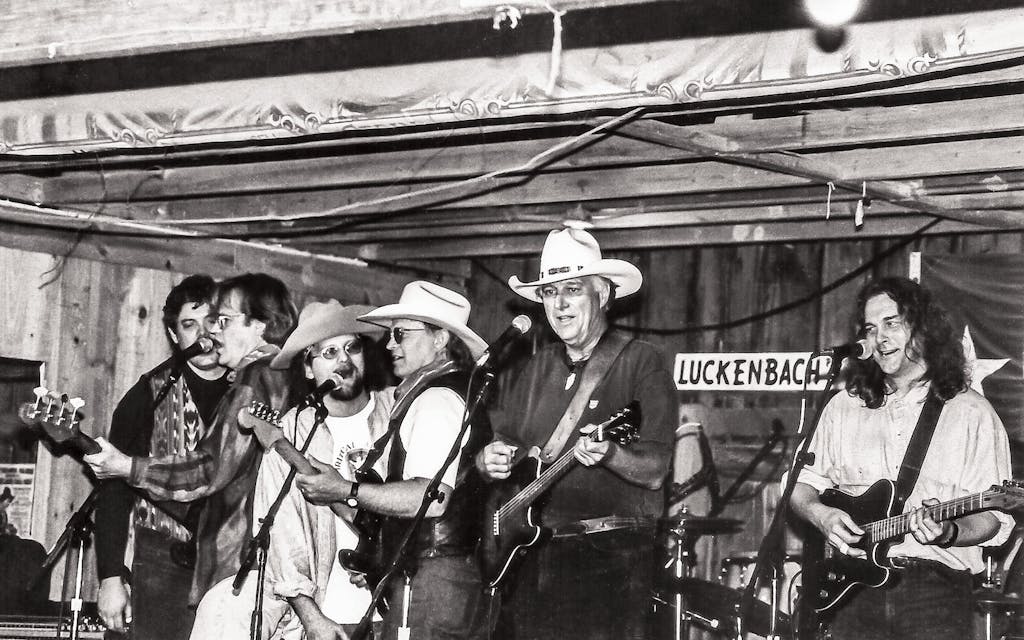
“You can’t really understand Luckenbach, and what makes it special, without delving into the history, culture, and the people who made the region what it is. Not all of the story is pretty, but it’s indispensable,” writes Becky Crouch Patterson in her book on Luckenbach. A visual artist and memoir writer, Becky has also authored a 1979 biography of her father and another book about the Stieler ranch, her mother’s family homestead in Kerr County, where she lives today.
Her family’s roots, like those of so many of the German Hill Country residents, run deep—back to the first ships that traveled from Germany to Galveston or Matagorda Bay in the late 1840s, and to the wagons that carried them west and north. Their bloodlines have been intertwined with the name Luckenbach since at least 1862, when one of her great-great-uncles was murdered by Confederate zealots. His name, Heinrich Stieler, is carved on one side of the Treue der Union Monument, the limestone obelisk that stands in Comfort to mark the graves of 36 Union loyalists who were killed by Confederate forces while trying to escape to Mexico. Heinrich’s name appears below that of August Luckenbach, the brother of Jacob and uncle of Carl Albert Luckenbach, whose land would pass through the Engels and down through Hondo and Shatzie to their children and grandchildren.
Reading Becky’s work, one gets the sense that Luckenbach has been both a blessing and a curse. “Yes, both happy and sad,” she said when I reached out to her. In Hondo, My Father, Becky writes openly about her dad’s unhappiness and loneliness, despite his public persona. While she denied Guich’s claim that Hondo was drinking too much, Becky explained that by the early seventies, the mohair business had taken a dive, and Hondo no longer spent his days working at the wool warehouse in Comfort. Shatzie’s attempt to “give Hondo something to do” worked in one sense, but it drove the two of them further apart, and they divorced in 1973. “Although Luckenbach became a disillusionment to our family, it was a source of comfort and security to Hondo during his lonely last days,” Becky writes. Hondo’s heart attack in September 1976 came on the heels of a marathon hard-partying session prompted by Jerry Jeff’s recording another album at the dance hall. After Hondo’s death, Becky writes, “Luckenbach was like a closed book.”
Except it wasn’t. She and her sister Cris each inherited 25 percent stakes in the business, while Kathy Morgan, who had partnered with Hondo shortly after the purchase, controlled the other 50 percent. (Guich had sold his interests in 1974 and moved to Hollywood to pursue an acting career.) In 1979 the trio put the nine acres up for sale, and it was still on the market in 1990, when Morgan told Texas Monthly, “Actually it has always been for sale. It just has to be the right buyer, someone who doesn’t want to turn it into something different.”
Apparently, the right buyer never came, and LTI trudged along with the same structure until the late nineties, when Becky’s son Kit joined the family business. Just a few years later, in 2004, the family was ruptured by a lawsuit: Cris accused Kit of trying to stage a coup and push her out of the business. A settlement was reached in which Kit and Cris would split LTI down the middle, and from then on, both parties would sign off on any major decisions. These proceedings were painful for the family. “You shouldn’t be fifty-fifty with anybody in a family business,” Becky said. “It’s just rough.”
Like Kit, she said she has an aversion to lawsuits. When I asked her about LTI’s litigation against Engel, she sounded genuinely surprised. “Oh my gosh, I didn’t know all that.” While she stood firmly against Skloss’s co-opting Luckenbach for his whiskey, she had a different take on members of the community using the name. “Those people are all invited to Luckenbach when we have our neighborhood friendship gathering.” They should be “grandfathered in,” she said. “They were there before anything.”
Despite the rough patches, the family inheritance has come with status and monetary rewards. For years, Lady Bird Johnson asked Becky and her musician husband, Dow Patterson, to serenade her dinner guests, including Henry Kissinger and Nelson Rockefeller. Cris married a wealthy San Antonian in the seventies (they later divorced, and Cris married John Graham in 1982), and her daughter Alice Welder has appeared in society publications. Meanwhile, the business of LTI is doing just fine.
Luckenbach receives north of 250,000 visitors every year. In recent months LTI converted a warehouse on the property to reduce the wear and tear on the general store—and to accommodate the growing range of Luckenbach-branded housewares, food products, clothing, and bric-a-brac it hawks. And four years ago, in a bid to “leverage its lifestyle brand,” LTI expanded by opening Luckenbach on Main, in Fredericksburg. There you can shop for all the Luckenbach merch imaginable: koozies, candied jalapeños, cutting boards, Christmas ornaments, key chains, shot glasses, and coasters. There’s even a little shiplapped room where you can pose for a selfie with a cowboy hat and a guitar. You don’t even have to go to Luckenbach anymore; you can just pretend.
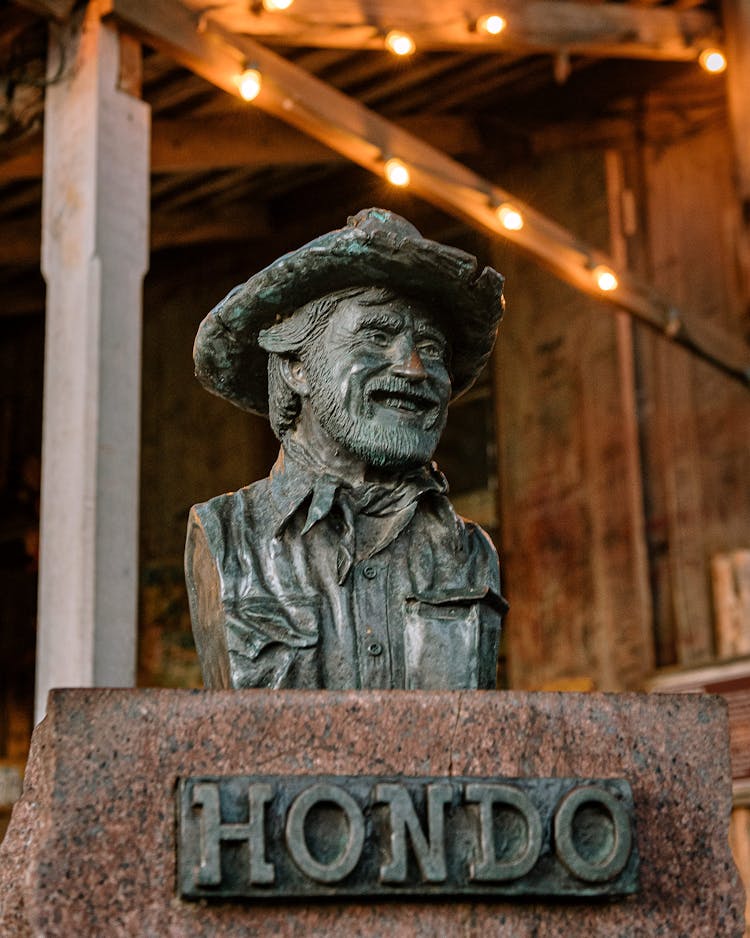
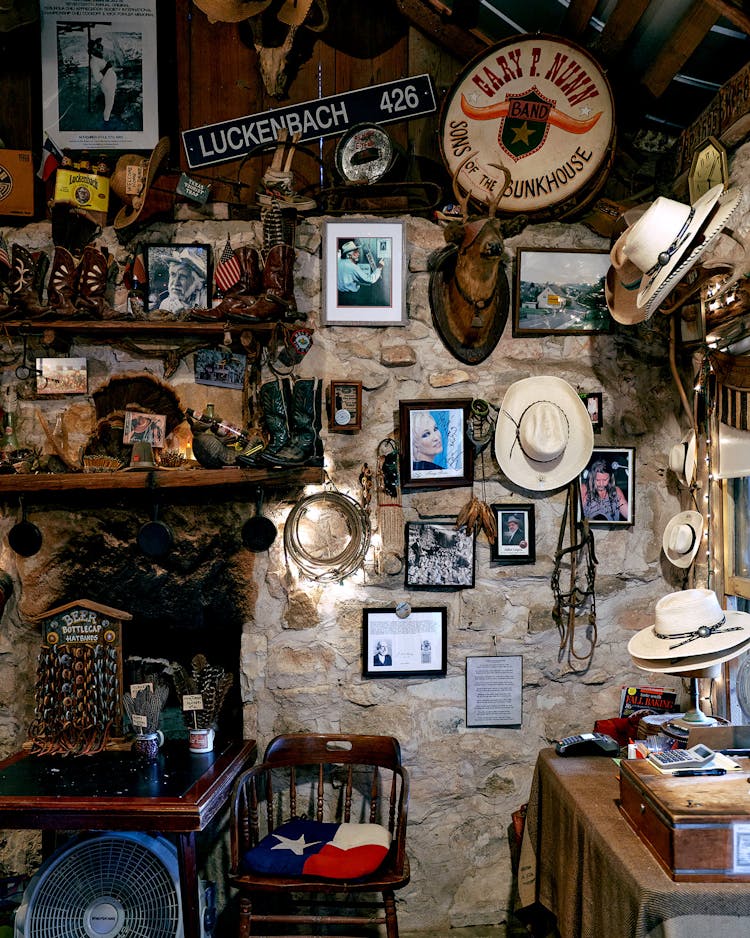
When I first heard about Skloss’s distillery, I imagined an adult Disneyland being constructed right on the dance hall’s doorstep. I was surprised, when I visited, to see how far away it is—five miles or so. But I was even more surprised by how much the area right around it had been developed in recent years.
The distillery sits on Highway 290, in the heart of Texas’s “little Napa Valley,” home to a fake German castle, seemingly endless vineyards, and places with names like “Yee Haw Ranch.” Little peach stands like Engel’s are sandwiched amid the sprawl. “There’s over one hundred and fifty wineries in this corridor,” Skloss told me when I visited his development. “And there are more and more every day. I don’t know if you’ve seen them, but I saw three new signs advertising one hundred-plus acres for sale.” I had seen them. They stood tall in the few remaining undeveloped pastures along the highway.
Soon the entire area will be transformed. Just southeast of Luckenbach, I was stunned to come across dozens of acres of denuded hills, a stretch that was still wooded when I’d seen it just a few months prior. A sign out front read, “Firefly Luxury RV and Tiny Home Resort.” There, some 221 lots will host turnkey vacation rentals “walking distance to the world-famous mecca Luckenbach.” Kit Patterson hadn’t mentioned this when we first spoke.
When we talked again this September, eight months after our first lunch, Patterson sounded weary. He too was sickened by what Firefly had done to the land. “This is the Hill Country now,” he sighed. “It’s being loved to death.”
I asked about Engel and the cease and desist letters that LTI has sent to other businesses in the Luckenbach area. Patterson explained he was in a lose-lose situation. On one hand, he hated to sue small businesses in the community, but he said that if the company failed to defend its trademarks, it would allow others to come in and slap “Luckenbach” on cans of chili or bottles of whiskey or anything else they wanted. “If we don’t fight to preserve what Hondo created, then it’s gone.”
But that effort has come at a cost. “When attention is drawn to this, it exposes the dirty laundry,” Patterson acknowledged. “When I look at Hondo’s life, there was a lot of heartbreak and pain. For myself, I’ve always tried to do the right things, but I’ve made some mistakes.”
LTI was dealt a blow this summer when its request for a preliminary injunction against Skloss was denied. Next fall, LTI and Skloss are scheduled to square off in court, this time with a jury determining the outcome. If the decision swings in Skloss’s favor, LTI could ultimately lose its registered trademark. In that scenario, LTI would have little recourse against future businesses using the name Luckenbach.
But for many who were attracted to Luckenbach’s charm decades ago, this Texas treasure has already undergone profound changes. Beneath the laid-back, “back to the basics” veneer, Luckenbach has evolved into a lucrative lifestyle brand. On one hand, the dance hall and general store and oak trees are all still intact, much as they have been for more than a century, but on the other, there’s no denying that the place feels increasingly sanitized. And one has to wonder what Hondo—who was outspoken against the commercialization of Luckenbach—would think about his visage being used to sell bags of coffee and scented candles.
This tension isn’t unique to Luckenbach. All over our rapidly changing state, we are being forced to consider who we are and what we’re going to be. We value the simplicity of these historic places, and yet the qualities that make them popular also imperil their future. For now, you can still glimpse the mythic qualities that make Luckenbach worth fighting for.
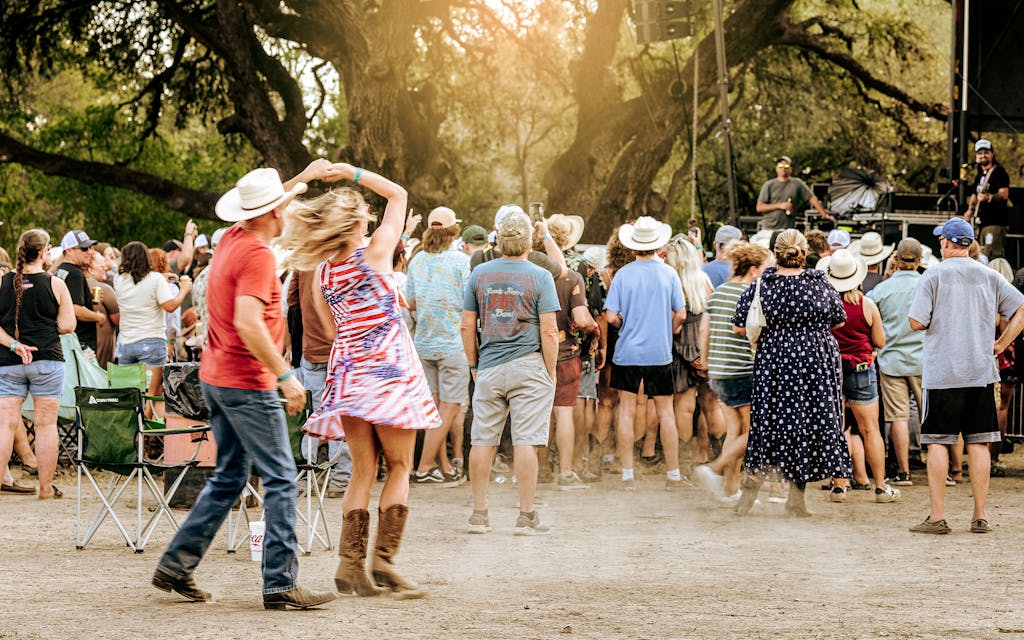
It’s Friday night in Luckenbach. A country group called the Wagon Aces kicks off a free concert in the dance hall. Soon, two-stepping couples rival the bikers for who’s sweatiest. A Stetsoned old-timer appears at the bar, slightly out of breath. “Hey, Butch,” the bartender greets him. “Hey, Greg,” Butch answers, dabbing his forehead with a bandanna. “Damn ghost drank my beer. He’s thirsty tonight.” Greg cracks him open another, and Butch totters back toward the music and another round on the maple dance floor.
Greg knows a lot of the people here by name. One couple drives up from Boerne most weekends, and a guy from Willow City stops by every day after he’s done running his sheep. But there are also plenty of tourists. Through the open doorway, Greg points out a family of German vacationers (dad in a ball cap, little girl in pigtails) failing miserably in their attempts to throw a loop over a roping dummy set up outside.
The band plays classics such as “Fraulein” and “Amarillo by Morning.” The dance hall shutters are propped open to catch the breeze. A couple waltzes, him in boots and her barefoot. They look as happy as anyone I’ve ever seen. I think about my friend Kent Finlay and the good times we had here. He always closed every songwriters’ circle with the same song. The chorus goes like this:
They call it the Hill Country, I call it beautiful
I’d call it progress, if it could be saved
They call it the Hill Country, I call it home
But what will we call it
When it’s leveled and paved?
This article originally appeared in the November 2022 issue of Texas Monthly with the headline “Sold Out!” Subscribe today.
This article has been updated to clarify the nature of a proposed whiskey collaboration between Stewart Skloss and LTI.
- More About:
- Texas History


